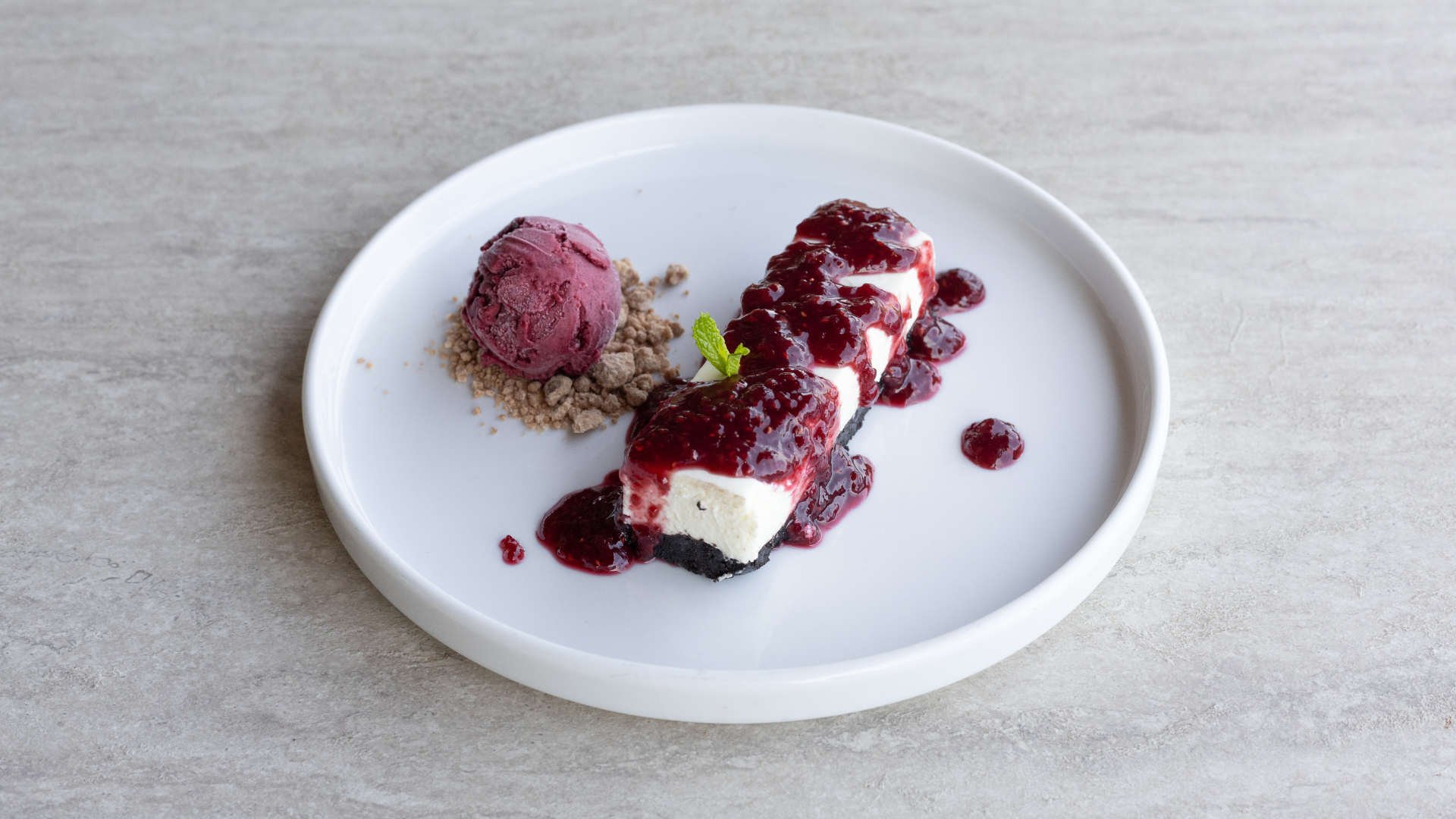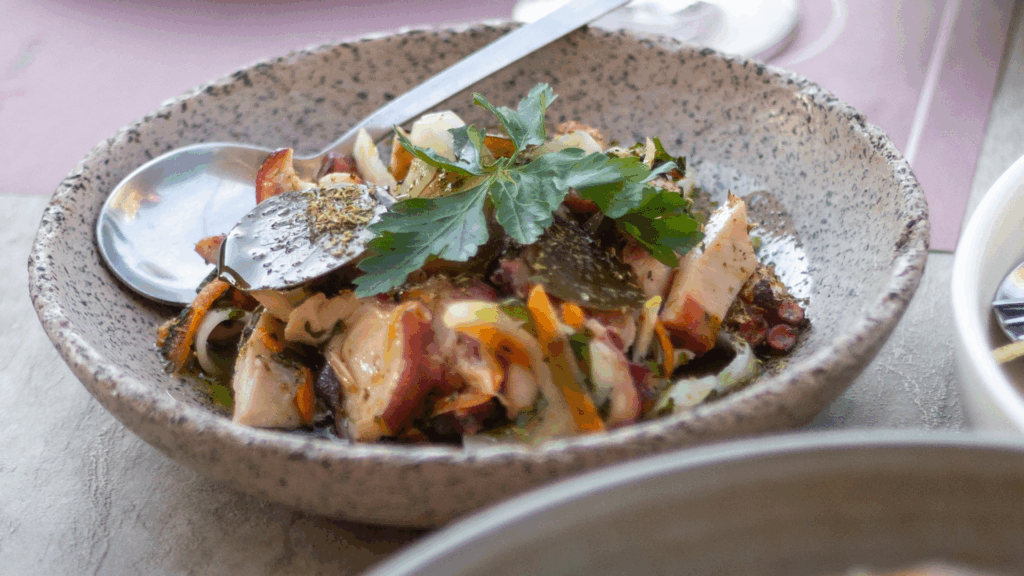Food in Crete isn’t just a meal—it’s a way of life. Cretan cuisine traces its roots to ancient traditions, draws character from the island’s geography, and grows stronger through generations of love. From hand-pressed olive oil and wild herbs to fresh cheeses and slow-cooked meats, every bite tells a story of simplicity, seasonality, and a deep connection to the land.
In this blog, we’ll explore what makes food in Crete so special. We will also talk about what to try and how to experience it authentically!

What Makes Food in Crete Unique?
To begin with, Cretan cuisine relies on local, fresh, and seasonal ingredients, staying deeply connected to the island’s geography and way of life. It doesn’t complicate things, but it delivers richness through flavor, tradition, and meaning. Specifically, the island’s rugged terrain, fertile valleys, and proximity to the sea supply an abundance of produce, herbs, fish, and pasture-raised meats. Cretans center their meals around extra virgin olive oil, legumes, wild greens (horta), seasonal vegetables, and cheeses like mizithra, graviera, and anthotyro. They often slow-cook or grill meats such as lamb, goat, or rabbit, seasoning them simply to let the ingredients shine. Fresh herbs like oregano, thyme, rosemary, and mint grow wild across the island, adding both flavor and aroma to every dish.
Beyond the ingredients, the philosophy behind food in Crete defines its uniqueness. People take their time at the table—they share, connect, and tell stories. Families and friends serve dishes family-style, encouraging everyone to sample and pass plates around. Locals pair meals with wine or tsikoudia (raki), and finish with a sweet treat or a warm gesture of hospitality. Cretans don’t just eat to nourish—they eat to celebrate and come together. That’s why food plays such a central role in every gathering, from everyday meals to weddings and religious festivals. This mix of fresh ingredients, simple methods, and tradition makes Cretan cuisine a beloved part of Mediterranean food culture.
Must-Try Dishes in Crete
When it comes to what to eat, here are a few essentials:
- Dakos: Barley rusk topped with grated tomato, local cheese (like mizithra), olive oil, and oregano
- Kalitsounia: Small cheese or herb-filled pies, often sweetened with honey or dusted with cinnamon
- Antikristo: Lamb cooked slowly over an open flame, seasoned with salt and nothing else
- Stamnagathi: Wild greens served with lemon and olive oil, often alongside meat
- Gamopilafo: A creamy rice dish traditionally served at weddings, cooked in meat broth and finished with lemon
These dishes reflect the soul of food in Crete: simple, nourishing, and tied to tradition.
Where to Experience Cretan Cuisine
The best way to experience food in Crete is to eat like a local. Look for places that highlight local produce, cook seasonally, and approach food with care and respect for tradition. In smaller villages, family-run tavernas often serve what’s available that day—from wild greens and snails to lamb cooked slowly over wood fire. In Chania Town, one of the best places to explore authentic Cretan flavors in a refined setting is Canale Restaurant. Located just opposite the Venetian lighthouse in the Old Town, Canale offers a menu rooted in Cretan tradition and elevated with modern technique and presentation. Signature dishes like Cretan carob pasta with mushrooms and truffle or Dakos with galomizithra and sea fennel showcase both local ingredients and creative flair. The ambiance blends old and new, reflecting Chania’s history while delivering a vibrant, contemporary dining experience.
Explore the menu and make a reservation at Canale Restaurant.

The Cultural Side of Food in Crete
To truly appreciate food in Crete, you need to see how deeply it connects to daily life. Meals unfold slowly, shared among friends and family, and filled with conversation and meaning. From casual weekday lunches to festive Sunday gatherings, Cretans use food to bring people together in a way that feels genuine and heartfelt. Philoxenia, or Cretan hospitality, goes far beyond good manners—it’s a proud tradition. Hosts often bring complimentary treats to your table: a dessert, a small glass of raki, or a surprise meze plate. These gestures reflect the island’s spirit of generosity and connection. Dining in Crete means more than enjoying good food. It creates moments, builds relationships, and tells a story.
Conclusion
To conclude, food in Crete is more than just sustenance. It’s heritage. From farm to table, Crete’s flavors reflect its people and land. For authentic, refined cuisine, visit us at Canale Restaurant. Let the flavors of Crete welcome you, inspire you, and stay with you long after your meal is over.
Book your table today, and experience Cretan cuisine at its best—without the worry of overspending.
Frequently Asked Questions (FAQs)
What makes food in Crete different from other Greek cuisine?
Cretan cuisine focuses on seasonal, local ingredients like olive oil, wild greens, legumes, and fresh cheeses. Its simplicity, purity, and connection to tradition set it apart from other Greek regional dishes.
Is Cretan food healthy?
Yes, the Cretan diet is considered one of the healthiest in the world. It emphasizes plant-based ingredients, whole grains, olive oil, and moderate portions of meat and dairy, all linked to heart health and longevity.
What are some traditional dishes I should try in Crete?
Don’t miss staples like dakos, kalitsounia, antikristo, and gamopilafo. Each dish reflects Crete’s unique food culture and its emphasis on flavor, simplicity, and local ingredients.
Where can I eat authentic Cretan food in Chania?
You’ll find traditional tavernas throughout the island, but for a refined and authentic take in Chania Town, Canale Restaurant offers a menu rooted in Cretan tradition and made with seasonal, locally sourced ingredients.
What is ‘philoxenia’ in Cretan dining?
Philoxenia means “friend to strangers.” In Crete, this translates to genuine hospitality—free desserts, small plates, or raki as a warm, welcoming gesture from your host.
Do I need a reservation at Canale Restaurant?
While walk-ins are welcome, we recommend booking in advance—especially during summer evenings—to ensure the best experience.



